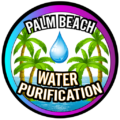Hard water problems can be a real problem. Solving those problems can greatly improve your family’s quality of life.
Hard water is water containing high mineral counts. Groundwater often moves through limestone where it picks up calcium and magnesium deposits.
Drinking water can contain small amounts of minerals like iron, which gets picked up from the soil, lakes and rivers – even older, corroded plumbing. In some areas, hard water can also contain manganese or aluminum.
Things like calcium, magnesium and iron aren’t totally bad for you, they’re actually beneficial nutrients. However, hard water sediments can also carry harmful bacteria with them. Hard water scaling is directly responsible for bacterial growth in residential drinking water.
If the water in your home comes from a well, you most probably have hard water. But it’s not just a well issue. In the United States 85% of homes in have hard water.
Here are a few potential problems hard water causes.
A bad odor or taste is often one of the first signs that you have a water conditioning problem. It’s a sign there is hard water or some sort of bacterial contaminant.
If your water has an unpleasant metallic taste. That’s most likely due to too much iron.
If your water stinks like rotten eggs, that could be naturally occurring hydrogen sulfide gas or certain bacteria reacting with magnesium to form sulfates.
Some people say their water tastes like dirt.
That could be actual dirt from old pipes or algae. Algae can also give tap water a moldy aftertaste.
Hard water can cause major plumbing issues as well.
Scale deposits build up inside your pipes, like plaque inside an artery, limiting the flow of water, eventually leading to backups and the need to call a plumber for help.
If you have PVC or copper pipes, this probably is not an issue. It’s most-common with older, steel and cast iron pipes.
Minerals cause hard water to react ineffectively with soap.
This makes it harder to get a good lather when you bathe. It also makes it more difficult to wash all the soap off your body, leaving a film of soapy residue on your skin.
Deposits from hard water can also clog up your shower head which causes weaker water pressure.
With hard water, you may not be getting as clean and you may notice your hair is hard to manage.
When you have hard water, you’ll notice nasty soap scum seems to accumulate all over the place. This is because soap and the minerals in hard water just don’t mix nicely together.
If your dishes are spotty, it may not be your dishwasher, it’s probably your water. What’s worse – soap scum left on shower curtains can lead to the development of a microbial biofilm that might contain disease-spreading bacteria.
With hard water, you may find yourself cleaning the bathroom and kitchen more often and using more cleaning product and unhealthy chemicals to get the job done.
Hard water can have a negative impact on laundry.
Soap is used to wash away dirt, but when soap doesn’t get rinsed off, it can actually increase soil build up on your clothes.
Clothes washed in hard water often appear dingy and wear out faster. It can even make your towels rough and hard.
If you have hard water, you may have to buy special laundry detergent formulated to soften the water for you. However, you’ll likely have to use more laundry detergent and hotter water to get your clothes clean.
Plus, just as iron can stain your bathroom fixtures, it can stain your clothes. Premature yellowing of your whites could be caused by iron content in the water. When combined with bleach, iron oxidizes, and iron oxide is just another name for rust.
Ugly brown or reddish stains on the porcelain are a big embarrassment.
You can blame hard water for that too – specifically iron.
It’s no coincidence those stains look a lot like rust spots. The iron in your water could be coming from rusty pipes.
You’ll have to use a lot of elbow grease to get rid of those stains.
Some people suggest using vinegar to help clean and remove them. Unfortunately, the stains will keep reappearing until you fix your hard water problem.
The most expensive hard water problem is your appliances will wear out quickly
Those scale deposits can wreak havoc on many appliances in your home, from the dishwasher to the hot water heater.
A buildup of sediment in your water heater can make it far less efficient. The same goes for other appliances. Poor efficiency means bigger utility bills.
The icemaker in your fridge can stop working as scale deposits clog. Hard water can cause a washing machine to wear out 30% faster than normal.
It’s estimated hard water expenses could cost you $800 or more every year.

